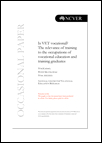Description
This paper explores the issue of how vocational education and training (VET) is actually used in the labour market, in particular the match between what people study and the jobs they get. This match is pretty poor in most occupational groups with the exception of the trades. However, the paper concludes that the mismatch reflects the generic nature of VET rather than wastage. This view is reached because a relatively high percentage of graduates report their training is relevant even though they do not end up in their intended occupation.Summary
About the research
Australia's vocational education and training (VET) system is characterised as being industry-led, with the content of courses based on the skills and competences specified by industry. VET courses have been packaged up into industry training packages developed by industry, with the aim of meeting the needs of an industry or a group of industries. This approach sits well with a view of VET as being about acquiring specific skills to be used in work. By contrast, we think of school and university education as having broader purposes, and often being ends in their own right. While university graduates tend to do well in the labour market, many have degrees which are generic in nature.
Is vocational education and training as narrowly vocational as the standard description seems to imply? Is VET vocational? The relevance of training to the occupations of vocational education and training graduates aims to throw some light on this question through a comparison of what VET graduates study and the jobs they get. To do this it uses data from the Student Outcomes Survey. For those graduates whose destination occupation differs from the intended occupation (obtained by assigning an occupation to each course), the study investigates the skill level of the destination occupation and the extent to which the graduates view their training as being relevant. The idea is to distinguish between training that is generic (in the sense of being relevant to a wide range of destination occupations) and training that is wasted. (Physicists driving taxis is the popular example.)
Key messages
- The match between what people study and the jobs they get is high for the technicians and trades group of occupations, but relatively low for most other courses.
- Most of the mismatch between intended and destination occupations reflects the generic aspect of vocational education and training. Graduates mostly report their training as relevant to their job, despite not ending up in the 'matched' occupation.
- There is some skills wastage, however, with graduates reporting that their training is not relevant to the occupation in which they find themselves. The two courses with the highest skills wastage are those for arts and media professionals and sports and personal service workers.
The study has three main implications. First, in thinking about the role of the VET system in addressing the needs of the labour market, it needs to be kept in mind that, with the exception of the trades, there is no neat match between courses and the occupations in which most people end up working. Second, those developing training packages need to be aware that many graduates will not work in their 'intended' occupation. Finally, potential students need to be realistic about the likely occupation that a particular course will lead to.
Tom Karmel
Managing Director, NCVER
Download
Related items
In this interview Steve Davis talks with Tom Karmel about his report 'Is VET vocational?', which exp… Show more
